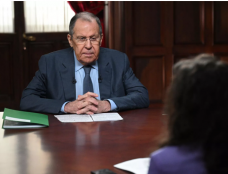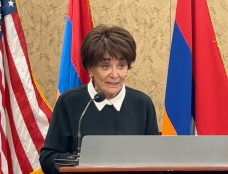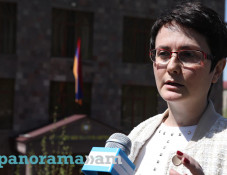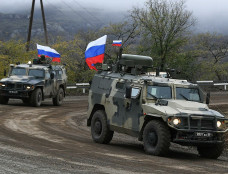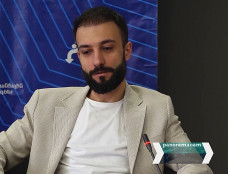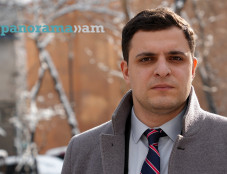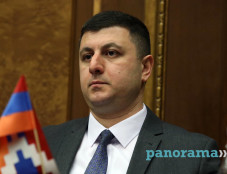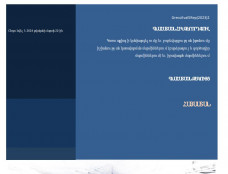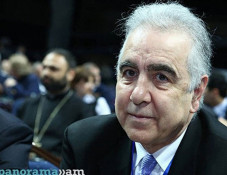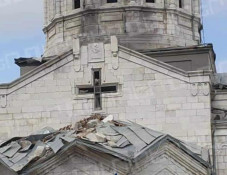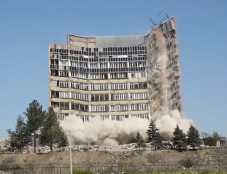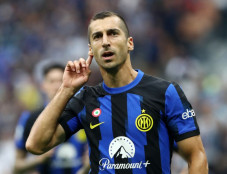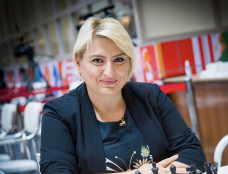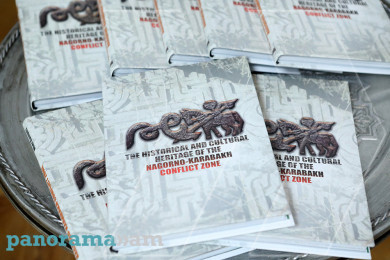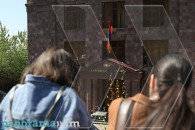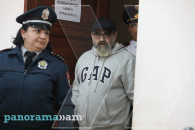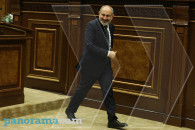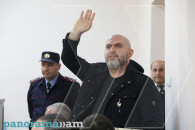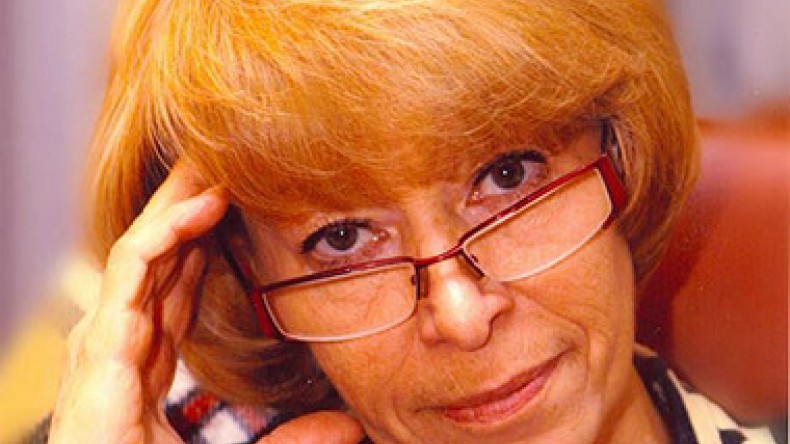
Russian journalist: In spite of war situation, Armenians treated with Khojalu population kindly
The interview placed on Xocali.net http://xocali.net/ru/kulchitskaya.html project site with a TV journalist Svetlana Kulchitskaya, covers the war taken place in Karabakh. As fate willed, she was the last person who met and talked with Khojalu people that were held captive for two days without preconditions and were voluntarily transferred to Azerbaijan.
- Svetlana Igorevna, you are one of the journalists who covered the Nagorno Karabakh conflict. Tell us, how did it happen that you appeared in the midst of events?
- I was in Karabakh in 1992, naturally because of my professional interest. It was a time, I would say, of "motion of earth formations" – everything moved, forming cracks in all layers of government and human activities. Concepts varied and got confused. And people were falling into these formed canyons as if knocked down. The politicians were holding experiments. And the most important thing was the self-determination. It, of course, was the most important, but for some other republics too necessary. But having no practical experience and rules how to break up peacefully, they started a war. In those years, I was an employee of Leningrad television and was familiar with many people who were following the developments in Karabakh, covering them in central and Leningrad press, like writer from Leningrad Igor Babanov, his colleague Constantine Voevodskii who was gathering information about Karabakh, and others. When watching the television reports, which were shown on the national television, I understood that the information provided were extremely scarce for me. I knew what the war was only from textbooks. I was always more interested in people, and therefore I believed that to understand how the common people lived in war conditions, how they perceived everything that happened on their lands and to tell about it, was my duty. And as far as I was familiar with a television operator, a native of Karabakh, where his family was living by then, the decision of leaving was made quickly. After a week of living in Yerevan, after waiting for a better weather, we flew by helicopter to Karabakh, which was being fired during the flight. In the helicopter were barrels of fuel, but luckily the bullet flew right between the barrels which saved us, otherwise I would probably be hovering somewhere in heaven today. The airfield was broken-down, and we landed in the mountains. We reached Stepanakert by car at high speed in order to avoid death. I was living in the basement in Stepanakert. Militias lived there in that building, as well as former employees of the television, the building of which was blown up. There were also teachers, tailors among those people, or officials as they say. People of most peaceful occupations. On the opposite site a few families lived: women, children and elderly people.
On the first day we met with the former cameraman of the studio, he invited us to his house which was partially ruined; his parents and brother lived in the basement. Their apartment was intact, but there was no heating, light and water there. We ate something from the canned stocks. The next day, died my new fellow - young, talented man. I did not hear from him even a word defaming people of other nation. He said that he does not want the death of civilians who live there where the fight is underway. He said that he had to defend his home, his land, his relatives. This was my first direct encounter with the death, which the war presupposes. Then there was enough of it.
- We also know that you have been the only one who had managed to shoot a video reportage about the villagers of Khojalu from the Azerbaijani side. Tell us how this meeting took place, you did you found yourself there, why did you decide to accompany them and till which point did you go with them.
- The next morning, after arrival, we started shooting the film and went to the front line, where the truce time was settled. And it was there that the act of transferring Khojaly population to Azerbaijani side was to be held.
- Did you manage to talk with them off-camera? Maybe they tried to say something or to give a hint on horrors that they had experienced, and were afraid that they will be heard?
- I talked to them, through an interpreter, before making the record on video. And whatever they told me, while answering my questions in front of the camera were identical to what they were saying without a microphone. I confirm this after twenty years. Especially my professional principles do not allow me to do otherwise.
- Were there Armenian militants with you there? How did they treat the Khojalu population? Have you noticed mistreatment with those people – were they driven, held at gunpoint, was there showed aggression towards them or towards you?
- Naturally, there were militia standing next next to them, they had guns in their hands, but on the opposite side, where the group was to pass there were armed soldiers of the Azerbaijani army standing there. I talked to them kindly, I can not say that those who accompanied them talked rudely or in boorish tone with them. Everything was within a business tone, no shouts. Although the war situation does not dispose to this.
- Have you noticed any signs of violence on the refugees? Bruises, wounds, traces of beatings, did any of them limp or did anybody hold any part on his body?
- I have not seen any beating or other signs of violence. Yes, their look was not for public review. But me too, I didn’t have an appearance for going out either.
- What most of all stuck in your memory?
- The most acute impression I got when looking at these women and children crossing the border to the Azerbaijani side. I was thinking that they were born on this earth not for enduring all the hardships of war, as well as those who left their families and was forced to take up guns to defend their homes, which as I saw were destroyed and burned. I saw in the hospitals people with ears cut off, they bombed the maternity hospital in Stepanakert in front of me. I met a boy, in front whose eyes the entire family was massacred. He had managed to hide under the bed. I've seen a lot in this life, but what is happening in the world today is like a mass psychosis. A feeling that the air is infected with aggression, that the bloodlust is flying in the air. Some kind of new coming of Dracula. Later, I met with the prisoners in jail, talking to a young man of Azerbaijani origin, who lived in an Armenian family that awaited her son from captivity, and I can say, and I have the video verifying that this young man would categorically reject fighting against Armenian militias in Karabakh. He said that it is better to die than to go out and kill people with whom he grew up. He realized that this response can then be interpreted against him, I gave him the opportunity to reject the question, but he replied that he wanted to talk about it. He was kept as a family member; he spoke on this without any pressure from my side. Especially because in my work I never used the expression degrading people of Azerbaijan or any other nationality, understanding and respecting every nation.
- You have been distanced from the war in Karabakh for about 20 years and it seems to me, you can assess the situation with fresh eyes. Tell me, in your opinion, why the Azerbaijani side began to collect eyewitness accounts after 23 years and did not do it then, when the trail was fresh?
- I understand all the psychological nuances of behavior of these people at that moment. They could be insincere or conceal their thoughts while crossing the border, but not that emotionally and in details. Figuratively speaking, they wouldn’t get points for that. If today these women who for some reason are interviewed about it only 22 years later, fully expressed the opposite view, this should only be on their conscience and the conscience of those who once again tries to inflate the flames of the war, let it be a propaganda war, but yet a war. And the war is contagious. And if the lessons of the death of their people and the children of their country is not a lesson for the politicians, then all kinds of methods are used on that way, even surveys of older people through the decades when they can, under the conditions that are created for them by their rulers, their ideologists, the apologists of bloodshed, only answer unequivocally - deny anything positive said about the former enemy.
The respected by me in many ways Franklin Roosevelt said: "For civilization to survive, we must cultivate the science of human relationships, the ability of all peoples, the most different ones, to live together in peace on the same land." And the amazing thing is that the word "war" itself does not cause uprising of the society as a whole. And, probably, it is because of that that the politicians manage to cause the hatred of one nation towards the other, just as I assess the interview after 22 years with those unhappy women who went under the Moloch of war, and the fathers of religion cannot find words; they do not want to go "on fire" for the salvation of their flock.
Newsfeed
Videos





